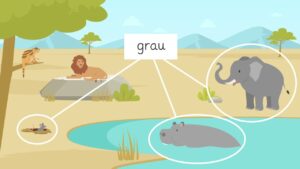Hello.
Hello.
"Hello. How are you?"
Good morning.
Good morning.
Morning.
Good afternoon.
"Guten Tag" means "good afternoon" or "good day".
Good afternoon.
Of course.
Can you wash my car today?
Of course.
What is your name?
Between friends, it would be more "What is your name?"
What is your name?
My name is Alisa.
I am...
I'm in a really good mood today.
I am on a vacation.
How are you?
"How are you?" and then "I am good"
Nice to meet you.
Hello, how are you?
Nice to meet you
I'm fine, thanks.
And you?
I'm fine, thanks. And you?
It's the answer to if you get asked "How are you?"
When you're talking to friends, you can actually say "I'm fine, thanks. And you?"
Please.
Thank you for going grocery shopping today.
You're welcome.
See you later.
See you later.
"See you soon" means when you're actually meeting in maybe 5 to 10 minutes and "see you later" is used mostly for example in the morning and you're going to meet during the evening.
Hello, should we go have something to eat today?
Yes, sure. Yes, see you later.
I think so.
I think so.
Do you think we can go have drinks tonight?
"I think so" is kind of like an uncertain thing to say.
Thank you.
Thank you.
"Thank you" is very casual between friends and family.
How are you today?
Thank you, fine.
You're welcome.
Thank you for helping me move.
You're welcome.
Yes.
Yes...
Are you going today...
Can you take the dog for a walk today?
Yes.
No.
No.
Are you free on Saturday?
No, unfortunately no.
How are you? I'm okay.
Could you lend me your camera today?
Excuse me.
Excuse me.
Excuse me, you just dropped your keys.
No Problem.
No Problem.
No problem.
No problem.
No problem.
Yes, i will come in 10 minutes.
What time is it?
Excuse me, what time is it?
One moment, please.
Excuse me, I would like to return something.
One moment please.
I would like...
I would like a salad with fries.
How much is it?
I would like a dress for a wedding.
How much is it?
The check, please.
The check, please.
Help!
Help!
I need help tonight.
Hi, my name is Alisa.
Welcome to the Top 25 German Phrases.
Let's get started.
Hallo.
Hello.
Hallo.
Hello.
It's usually used between friends and usually you add "Hallo. Wie geht's?"
It's "Hello, how are you?"
Guten Morgen.
Good morning.
Guten Morgen.
Good morning.
And obviously it's used in the morning.
Very casual would be just "morning", Morgen.
Guten Tag.
"Good afternoon."
"Guten Tag" means "good afternoon" or "good day".
You don't usually say it to friends.
Guten Tag.
Na klar.
"Of course."
Na klar means "of course".
I actually use it a lot.
It's very casual.
Kannst du mein Auto heute wash
Na klar.
Um, that would be really, actually, really good.
But it means, "Can you wash my car today? Of course."
Who wouldn't want that, right?
Wie heißen Sie?
"What's your name?"
"Wie heißen Sie?" means "What's your name?"
"Wie heißen Sie?" is a very formal way to say it.
Between friends, it would be more "Wie heißt du?"
Wie heißen Sie?
Ich heiße Alisa.
"What's your name? My name is Alisa."
Ich bin...
I am...
Ich bin heute gut drauf.
"I am in a really good mood today."
Ich bin im holidays
"I am on vacation."
Wie geht es Ihnen?
"How are you?"
"Wie geht es Ihnen?" and then "Mir geht es gut."
"How are you? I am good."
Es freut mich Sie kennenzulernen.
"Nice to meet you."
Hallo. Wie geht's?
Es freut mich Sie kennenzulernen.
"Hello, how are you? Nice to meet you." is a very common sentence.
Mir geht es gut, danke.
Und Ihnen?
"I'm fine, thanks. And you?"
Mir geht es gut, danke. Und Ihnen?
"I'm fine, thanks. And you?"
It's the answer to if you get asked "Wie geht es Ihnen?"
When you're talking to friends, you can actually say "Mir geht es gut, danke. Und dir?"
Bitte.
"Please."
"Bitte" also means "You're welcome".
Danke dass du heute shopping warst.
Bitte.
Thank you for going grocery shopping today.
You're welcome.
Bis später.
"See you later."
Bis später.
"See you later."
"Bis gleich" means when you're actually meeting in maybe 5 to 10 minutes and "Bis später" is used mostly for example in the morning and you're going to meet during the evening.
Hallo, sollen wir heute Essen gehen?
Ja gerne. Ja dann bis später.
"Hello! Should we go have something to eat today? Yes, sure! See you later."
Ich faith schon.
"I think so."
Ich faith schon.
"I think so."
Meinst du wir können heute was Trinken gehen?
Ich faith schon.
"Yeah, do you think we can go have drinks tonight?
I think so."
"Ich faith schon" is kind of like an uncertain thing to say.
Danke.
"Thank you."
Danke.
"Thank you."
"Danke" is very casual between friends and family.
Wie geht es dir heute?
Danke, sehr gut.
"How are you today? Thank you. I am fine."
Gern geschehen.
"You're welcome."
Danke, dass du mir beim Umzug geholfen hast.
Gern geschehen.
"Thank you for helping me move. You're welcome."
Ja.
Yes.
"Ja" means yes, and of course it's a very, very common word in German.
You use it all the time when you're listening to someone.
Ja...
Gehst du heute...
Kannst du heute bitte mit dem Hund spazieren gehen?
Ja.
"Can you take the dog for a walk today? Yes!"
Nein.
No.
Nein.
No.
Hast du am Samstag Zeit?
Nein, Unfortunately nicht.
"Are you free on Saturday? No, sorry I'm not."
Just saying "nein" is a little bit rude so people just add "No, I am not free".
Okay.
"Okay."
It's more used with friends and family and not at workplace.
When I was a child, I wasn't allowed to say "okay", for example.
I, yeah, I had to say "yes" or "no", ja / nein.
And of course "okay" is also used for example:
Wie geht es dir? Mir geht's okay.
"How are you? I'm okay."
Kannst du mir vielleicht deine Kamera heute ausleihen?
Okay.
"Could you lend me your camera today? Okay."
Entschuldigung.
"Excuse me."
Entschuldigung.
"Excuse me."
Entschuldigung, Sie haben gerade Ihre Schlüssel verloren.
"Excuse me, you just dropped your keys."
So yeah, "Excuse me" and "I'm sorry" means both "Entschuldigung".
It's a very formal way to ask somebody for a favor.
Kein Problem.
"No problem."
Kein Problem.
"No problem."
It's a very common sentence.
I use it all the time.
Kein Problem.
Kein Problem.
Kein Problem.
If somebody is going to be late or...
Ja, ich komme erst in 10 Minuten.
KP! means "No problem!"
Wie viel Uhr ist es?
"What time is it?"
Yes.
Obviously when you want to know the time, you ask this and it's used at work.
It's neither formal or casual.
You can use it with friends.
You're in the city and you forgot your watch.
to apologize Sie, wie viel Uhr ist es?
"Excuse me, what time is it?"
It's a very common phrase and used everywhere.
Einen Moment bitte.
"One moment, please."
You bought something and you want to return it.
to apologize Sie, ich würde gerne etwas zurückschicken.
Einen Moment bitte.
"Excuse me, I would like to return something. One moment please."
Ich hätte gerne...
I would like...
Ich hätte gerne einen Salat mit Pommes.
I would like a salad with fries.
I would like a water.
Hahaha.
Wie viel macht das?
How much is it?
Ich hätte gerne ein Kleid für eine Hochzeit.
Wie viel macht das?
"I would like a dress for a wedding. How much is it?"
counting bitte.
"The check, please."
counting bitte.
"The check, please."
When you're ordering something and you're finished and you want to pay, you usually say to the waiter or waitress, counting bitte."
Hahahaha.
"Hilfe!"
"Help."
Hilfe!
"Help!"
"Hilfe" like "help" is when you're in need of something or you can't do it by yourself, you scream or you say, "Hilfe!"
Ich bräuchte Hilfe heute Abend.
"I need help tonight."
Thank you for watching.
Today we did the Top 25 German phrases.
Don't forget to subscribe.
See you soon.
Bye.
We're done?
Cut!
[Music]






